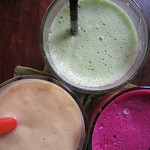Liquid Calories and Weight Loss
Posted by Janine Wong MS, RD on November 26, 2012

The Starting Line:
Do calories from liquids contribute to weight more than calories from solid food?
Sugar-sweetened beverages get a lot of the blame for the obesity epidemic. There are a variety of proposed reasons for why liquid calories affect our bodies differently than solid calories; liquid calories do not require chewing, they stimulate digestion differently than solid calories, and they empty faster from the stomach. A recent study by DiMeglio and Mattes compared solid versus liquid calories in the form of jelly beans and soda. Subjects were given a daily supply of 450 calories of either jelly beans or soda for 4 weeks, and allowed to consume them at any time of day. When people ate jelly beans, they displaced other foods so their overall calorie intake - and weight - stayed level. However, when subjects drank 450 calories from soda they did not compensate for these calories. They actually ate more calories in the rest of their diet, resulting in weight gain.
Liquids are often the easiest place to start with calorie reduction. Another study by DellaValle, et al compared caloric (orange juice, cola, and milk) versus non-caloric (water, and diet cola) beverages in non-dieting women. Subjects were provided with 12 ounces of each beverage and instructed to consume the beverage with a buffet lunch. Again, subjects did not completely compensate for the calories from the beverages, and consumed an average of 104 calories more when they had a caloric beverage with their lunch. However, satiety ratings (how satisfied you are after a meal) in all beverage conditions were the same. Therefore, non-caloric beverages promote satiety in the same way as caloric beverages, without contributing the extra calories.
Calorie restriction through liquid calories also appears to be more effective than restriction of solid calories. Chen, et al, reviewed food diaries and weight records of 810 adults in the PREMIER trial - a dietary and behavior modification program for adults with high blood pressure. They found that a daily reduction in 100 liquid calories resulted in 0.3 kg of weight loss after 6 months; compared to a daily reduction of 100 solid calories, which only resulted in 0.06 kg of weight loss. A greater reduction in liquid calorie intake was correlated with more weight loss.
Check out the table below to see where you can start cutting calories, and easy substitutions you can make
| Beverage | Portion | Calories |
| Water | Any | 0 |
| Tea | 8oz | 2 |
| Coffee | 8oz | 2 |
| Diet soda/Alteratively sweetened beverages | 12oz | 0 |
| Skim (fat free) milk | 8oz | 83 |
| 1% (low fat) milk | 8oz | 102 |
| 2% (reduced fat) milk | 8oz | 122 |
| Whole milk | 8oz | 149 |
| Cola | 12oz | 151 |
| Ginger Ale | 12oz | 124 |
| 100% Juice | 12oz | 175 |
| Beer | 12oz | 153 |
| Wine | 6oz | 147 |
The Finish Line:
Liquid calories are likely to contribute to weight gain. Substituting calorie-free beverage can help with achieving a healthy weight.
References:
1. Chen, L., Appel, L.J., Loria, C., Lin, P., Champagne, C.M., Elmer, P.J., Ard, J.D., Mitchell, D., Batch, B.C., Svetkey, L.P., Caballero, B. Reduction in consumption of sugar-sweetened beverages is associated with weight loss: the PREMIER trial. American Journal of Clinical Nutrition. 2009, 89:1299-1306. http://www.ncbi.nlm.nih.gov/pubmed/19339405
2. DellaValle, D.M., Roe, L.S., Rolls, B.J. Does the consumption of caloric and non-caloric beverages with a meal affect energy intake? Appetite. 2005, 44:187-193. http://www.ncbi.nlm.nih.gov/pubmed/15808893
3. DiMeglio, D.P., Mattes, R.D. Liquid versus solid carbohydrate: effects of food intake and body weight. International Journal of Obesity. 2000, 24:794-800. http://www.ncbi.nlm.nih.gov/pmc/articles/PMC2556245/
4. USDA Nutrient Data Laboratory
Photo credit: gurms via photopin cc
*Note: This general information is not intended to be a substitute for medical treatment or advice. Always consult a professional before making changes to your health and wellness practices.
Feedback or suggestions for future topics? Let us know!
